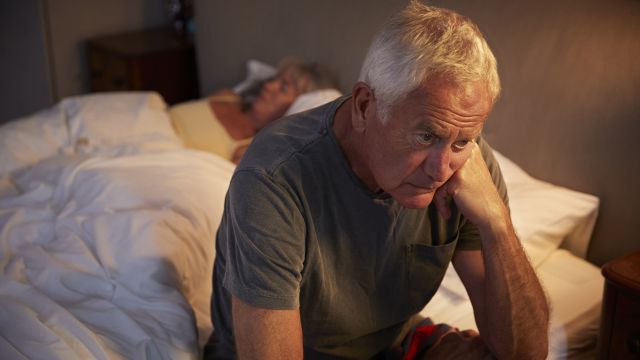Updated on October 16, 2023.
Sleep is essential to good health, and adequate amounts of sleep are important to cognitive function, cardiovascular health, energy levels, cellular repair, appetite, hormone levels, metabolism, and immune function—all things that are important when your body is fighting a disease like cancer.
Unfortunately, sleep disorders are common among people with many forms of cancer. Here, we look at the different types of sleep disorders and the relationship between cancer and sleep disorders, as why you need to talk to your healthcare provider if you’re having difficulty sleeping.
Types of sleep disorders
People with cancer can experience a number of different sleep disorders. Sleep disorders disrupt normal sleeping patterns. Examples of sleep disorders include:
- Insomnia. People with insomnia have difficulty falling asleep or staying asleep. This results in inadequate amounts of sleep, or sleep that is poor in quality.
- Hypersomnia. People who have hypersomnia experience excessive sleepiness during the day, difficulty staying awake, and difficulty waking from sleep.
- Circadian rhythm disorders. This type of sleep disorder disrupts the body’s internal 24-hour clock that regulates the sleep-wake cycle. A person with a circadian rhythm disorder may feel sleepy at inappropriate times, may have trouble falling asleep at normal bedtimes, and may have difficulty waking up when they want to.
- Sleep disordered breathing. Also called SDB, this is a group of conditions that cause breathing to become very shallow or stop during sleep. Sleep apnea is one example of sleep-disordered breathing.
- Parasomnia. Parasomnias refer to unwanted events during sleep, such as sleepwalking, frequent nightmares or night terrors, and sleep paralysis.
Insomnia and circadian rhythm disorders are the most common sleep disorders reported among people with cancer.
How cancer can affect sleep
Having cancer and being treated for cancer can impact a person’s ability to sleep in a number of ways:
- Cancer and cancer symptoms: Sleep disturbances may occur as a result of having cancer, as some patients report that they have difficulty sleeping before being diagnosed. For example, patients with lung cancer may experience symptoms like coughing, trouble breathing, and pain, which can make it difficult to sleep.
- Side effects from treatment: Many people who undergo chemotherapy and/or radiation therapy report experiencing sleep disturbances, but many other medications can cause side effects that can disrupt sleep.
- Physical changes: Cancer and surgery to treat cancer can cause physical changes to the body, which may have an effect on sleep. For example, a physical change may cause pain or change the way a person breathes.
- Stress: The stress of being diagnosed with cancer and living with cancer is stressful, and stress can also have a negative impact on sleep.
- Being in the hospital overnight: Treating cancer may involve a stay in a hospital. People staying in a hospital overnight may find it difficult to get a good night’s sleep.
Sleep disorders may also be the result of a health condition or life event that is not related to the cancer.
Talk to your healthcare provider
Cancer, cancer treatment, and sleep are different experiences for every person, which is why it is important that you speak with your healthcare providers (HCPs) if you are having difficulty sleeping. Your HCPs can work with you to come up with a plan to get the rest that you need. Remember that sleep is an important part of your health, and that getting an adequate amount of rest is an important aspect of treating cancer and coping with the side effects of treatment.







